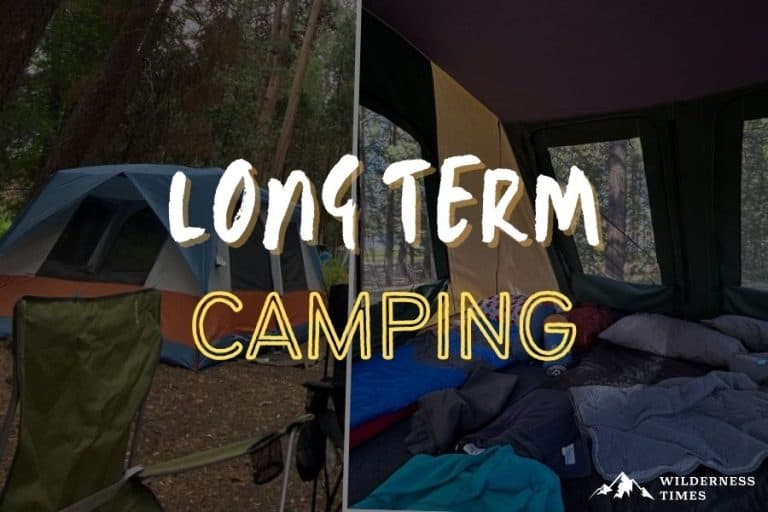Camping is a wonderful adventure everyone should try at some point in their life.
But what about long term camping?
That’s a whole ‘nother story.
Staying in nature for a long time is amazing and when done right, it can be quite enjoyable – but you can’t just pack a few things and hope for the best.
In this article, I’ll share some tips and tricks on how to make the best of this unique camping experience.
Let’s get started!
What Is Long Term Camping?
Long term camping is basically living in a tent.
It’s as close as it can get to living a simple life in nature. You’re leaving the comfort of your home to enjoy a more nomadic way of life.
When it comes to the length of the trip, there really is no simple definition. But generally, we consider an extended stay outdoors for weeks, or even months at a time to be a long term camping trip.
In other words, you’re staying way longer than you would on a casual short term camping trip.
7 Tips For Long Term Camping Preparation
Camping long term requires adequate preparation. Otherwise, an enjoyable trip can quickly become a nightmare.
So, here are seven tips that will help you prepare for it.
A High-Quality Tent Is A Must
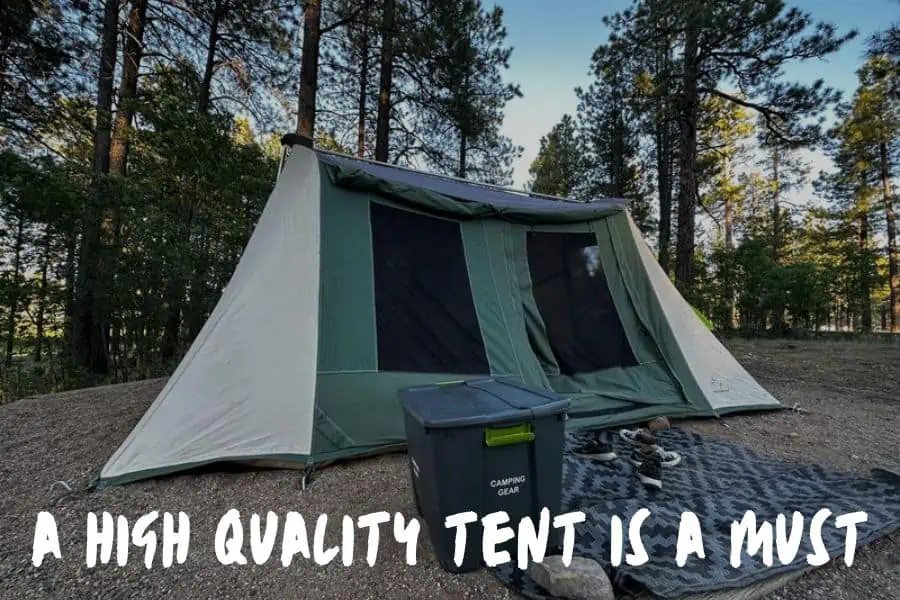
When you’re setting up camp for a day or two, your tiny 2-person tent is more than enough. You just need a place to rest your head for several hours during the night, and maybe some space for your gear.
But, if you plan on camping long term, you need a tent that’s both roomy and comfortable. But if you’re moving a lot, you need to make sure it’s not heavy.
Spacious but lightweight? It’s possible.
Those are high-end tents that come with premium features at a premium price. But in this case, they’re well worth it.
After all, you want to be sure your tent can stand up to all the different weather elements that you might come up against.
And this is where a long term canvas tent can make all the difference. If you are truly going to be living in a tent, you should do it right.
Which brings us to the next point.
Staying Cool Or Warm
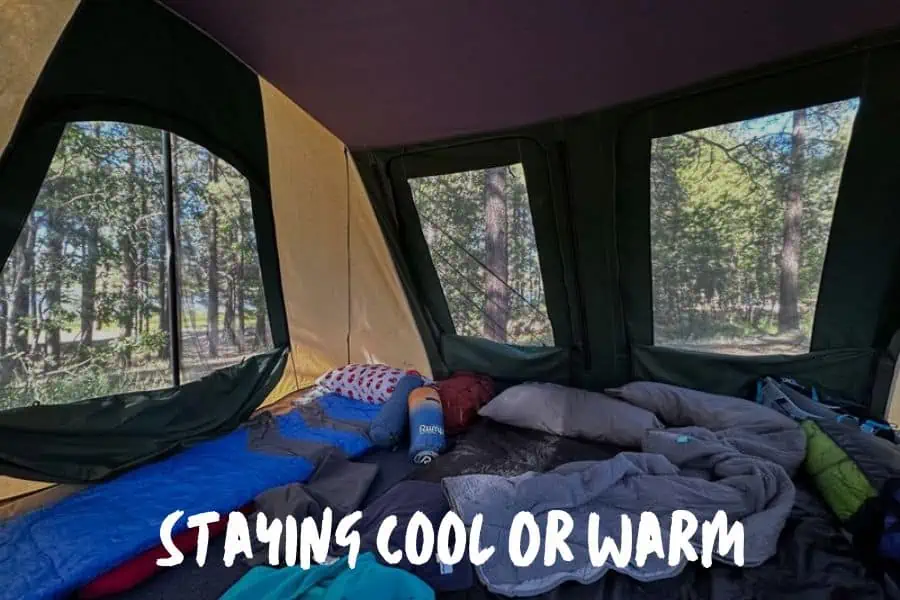
When you’re camping long term, you’ll experience weather changes. So, you need to be prepared for that.
If you expect warm weather during your trip, I’d recommend getting a 3-season tent for that part of the adventure.
Why not just get a 4-season tent and use it all year long?
Because the 4-season rating is somewhat misleading. These tents are made to protect you from extreme winter conditions, which also means they don’t have proper ventilation in the summer.
You’ll be quite hot if you try using one in the summer, trust me.
Obviously, during summer, you can expect to be warm inside a 3-season tent, too. But, there are ways to stay cool.
If you have space in your truck and you’re camping somewhere where you have access to electricity, an AC will be a real life saver. There’s nothing worse than tossing and turning at night, struggling to fall asleep while it’s 100 degrees in your tent.
But even if you’re in the middle of nowhere with no outlet to plug an AC in, it doesn’t mean you have to sweat it out. Portable fans do quite a good job at cooling down a tent, and they work on batteries. They’re also lightweight and take up almost no storage space.
If it’s cold, there are ways to warm up your tent, too. Beyond great insulation, you’ll also want to consider getting a tent stove.
First things first – bottom insulation. Most heat gets lost through the floor, so using a tarp or a tent footprint is a must.
When it comes to tent walls, a rainfly or a tarp above the tent assures you stay both warm and dry.
Make Sure You Have Enough Food

Staying outdoors long term can awaken your inner hunter and you might resort to catching your food.
It can actually be quite fun. I like to catch fish or collect edible berries, and it really makes me feel closer to nature.
But on extended camping trips, you can’t rely solely on finding your food. On the other hand, your storage is limited, and you can only pack so much.
So what can you do? Your best bet is to stock up on dried and canned foods.
Meat goes bad rather quickly, and you need a good cooler to store it properly. While you probably have one, you simply don’t have the space to pack enough food for the entire trip.
But, protein-rich food is important, as you’re using a lot of energy outdoors. So, stock up on beans, lentils, nuts etc. These are all rich in nutrients and can be stored outside for a long time.
I always pack rice and pasta when camping. These are quick to make, and can be combined with just about any veggies you can get your hands on.
Stay Hydrated
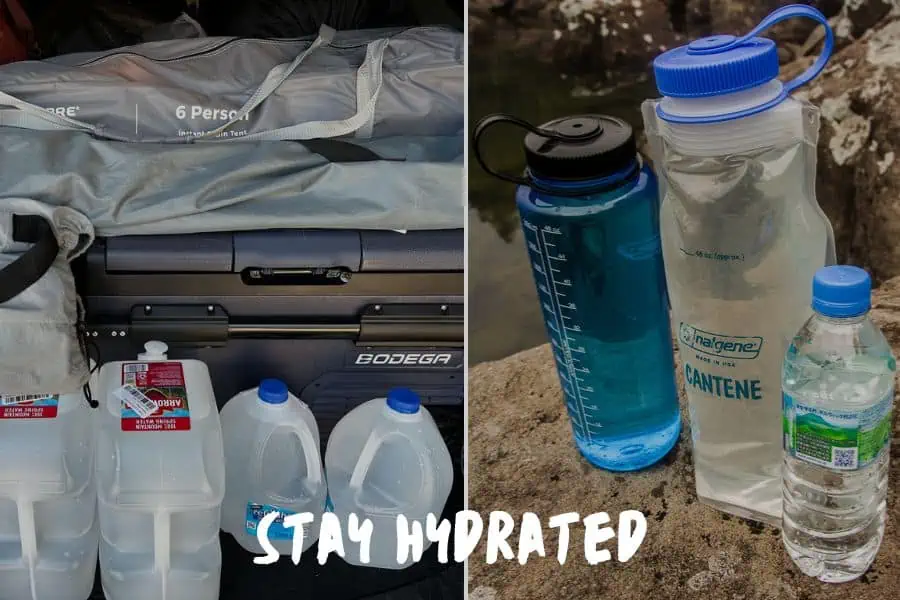
You’re set on food, but what about water?
If you’re camping near a water source, you don’t have to worry about satisfying your daily intake.
Obviously, you shouldn’t drink straight from the pond, unless you want to risk getting giardia or some other intestinal disease.
You need to clear water of bacteria first by purifying it.
Purification tablets and filter straws are things you should always have available. But in case you run out of them, you can boil the water.
I’ll warn you, neither of these methods will make the water taste nice, but hey, at least it’s safe!
But what if you don’t have a water source nearby?
Well, you need to be more creative.
Collecting water from precipitation is one way you could do that. If it looks like it’s going to rain, lay out some clean containers.
I’ve seen people drinking collected water straight off of a tarp.
Don’t do that.
No matter how well you might have washed your tarp at home, pathogens can collect on the surface, and you don’t want them ending up in your mouth.
During winter, snow is another possible water source.
Once again, I’d advise boiling it first. It’s a common misconception that bacteria can’t survive that much cold. In fact, one type of bacteria was found in 120,000-year-old ice.
Don’t Forget About Hygiene
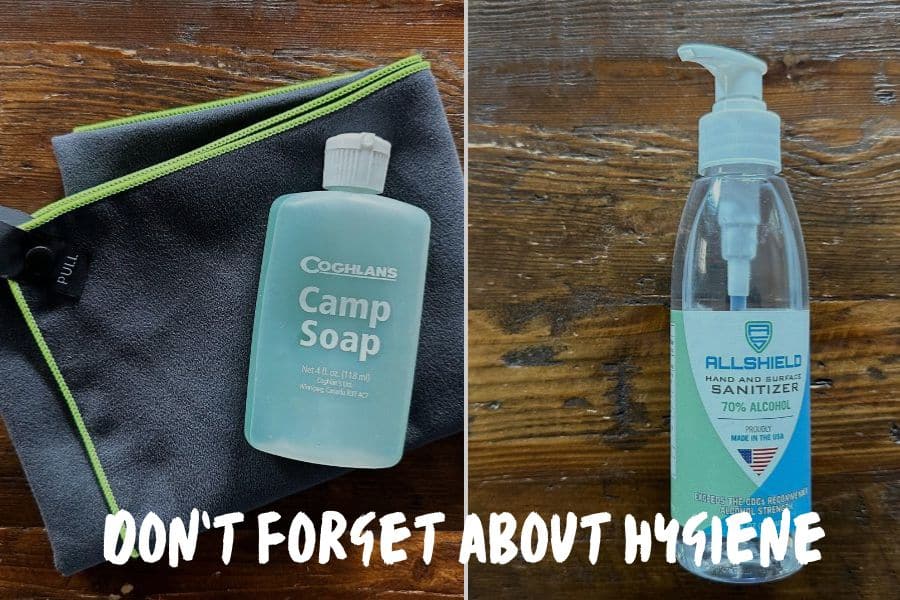
Not going to lie, keeping up with hygiene can be difficult during an extended camping trip. Especially if you’re used to sitting under the shower until you run out of hot water.
But at the very least, you’ll learn to be less high-maintenance.
First, stock up well on wet wipes. If possible, get the biodegradable ones, as they’re made of cotton, not plastic. That way, you can bury them, and rest assured they’ll break down naturally.
Wet wipes are great for washing your face and hands both in the morning and evening. But washing your body and hair might be a bit more difficult unless you’re at a campground with all the amenities including running water, or have a portable camp shower with you.
During hotter months, you can expect to sweat quite a lot.
And if you’re fishing during the day… Well, you can expect to smell like a dead fish by the time you’re done.
Add sunscreen and some dirt to the equation, and you’ll be a magnet to wildlife.
Once again, camping near a water source makes your job a little easier.
If there aren’t any lakes or rivers nearby, you’ll have to master the art of a navy shower. This method originated in the Navy, as a way of preserving as much freshwater aboard as possible.
The idea is to get wet, turn off the water while soaping up, and then quickly rinse it off. Basically, you can do this with as little as 3 gallons of water. For comparison, a ten minute shower at home uses as much as 60 gallons.
For hair, I always have either a dry shampoo or baby powder packed. Just make sure it’s unscented, as you don’t want to attract bugs or other animals.
Comfortable Sleep Above Everything
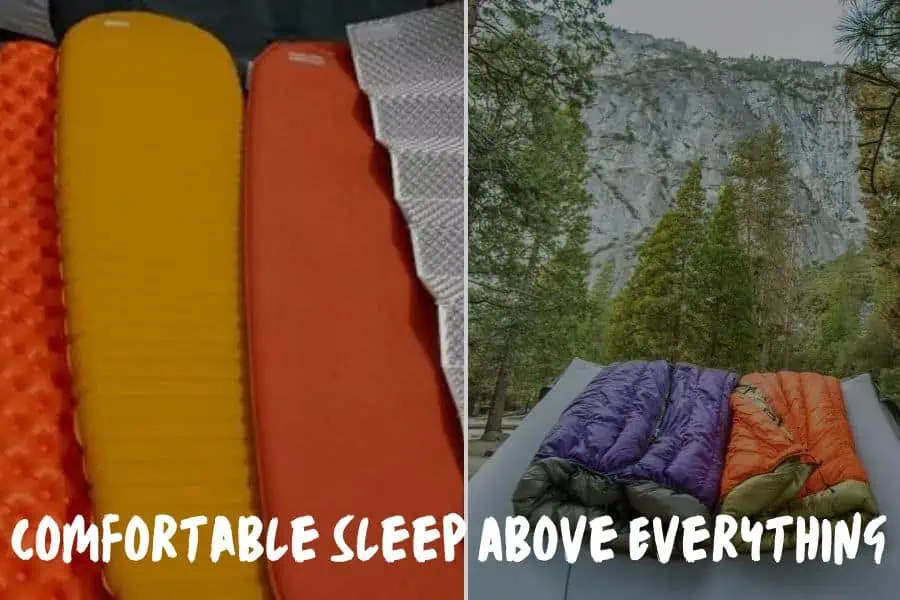
I don’t know about you, but as I grow older, I cherish a good night’s sleep more and more.
I can get by with a thin sleeping pad for a night or two. But when I’m on a long camping trip, chronic back pain is something I don’t want to have to deal with.
Just like tents, it’s worth investing in a good mattress or a pad. What’s the point of waking up in nature if you’re going to spend the rest of the day bent over like The Hunchback of Notre Dame?
If you decide on using an air mattress, you should know these are comfortable, but not great at insulating. During colder months, you’ll have to add something to stay warm. A foam topper above, and a space blanket underneath the mattress is what I’d choose.
Oh, and if you have enough storage space, pack the pillow you use at home. Those inflatable camping pillows don’t come close when it comes to comfort.
No less important is a high-quality sleeping bag. It needs to be suitable for the weather conditions you’re expecting during your camping trip.
Make sure its temperature rating is appropriate. And I’m talking about the comfort rating, not the survival rating.
Pack The Right Clothes
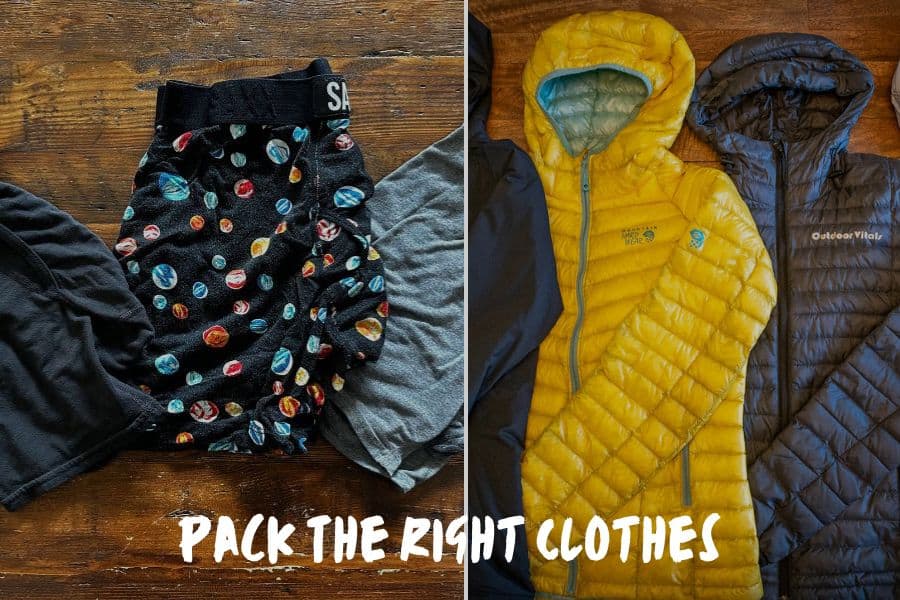
Since storage is limited, you have to dress practically.
So choose versatile outfits that you can wear over and over again.
Generally, activewear is a great choice for outdoors, as it’s comfortable and sweat-wicking. Plus, you don’t need to wash it after each use.
During spring and fall, temperatures can change drastically during the day, so dress in layers.
If it’s going to get cold, thermal underwear is irreplaceable. It’ll keep you warm like no other when temperatures drop.
Remember, you’ll have to wash your clothes, too. So make sure to pack clothes made of materials like polyester or merino, that dry completely in just a few hours.
To Sum It Up
Long term camping can be quite an experience.
Waking up to the sound of nature every day is unbelievably calming.
But the freedom and tranquility do come at a price. To enjoy this kind of trip to the fullest, you need to do some serious preparation.
With these tips, you know what to focus on, so pack your stuff, prepare thoroughly, and go enjoy a stress-free camping adventure.


